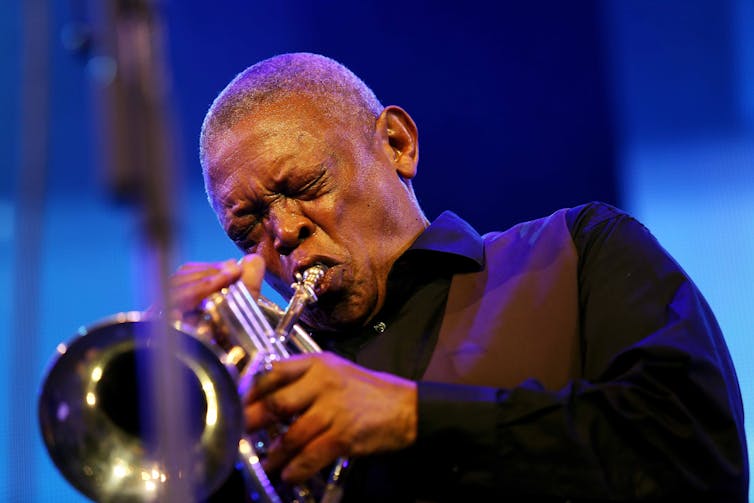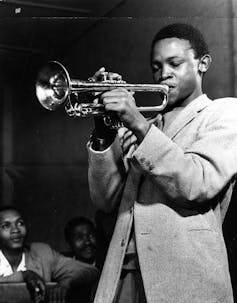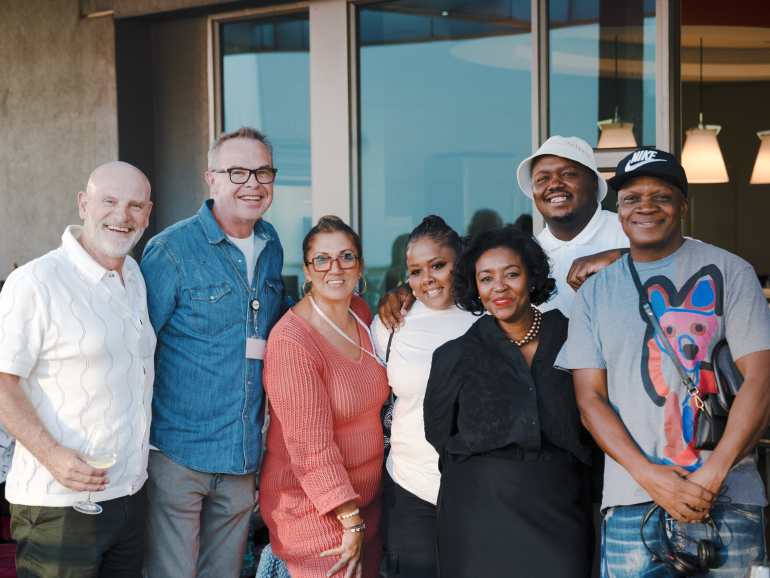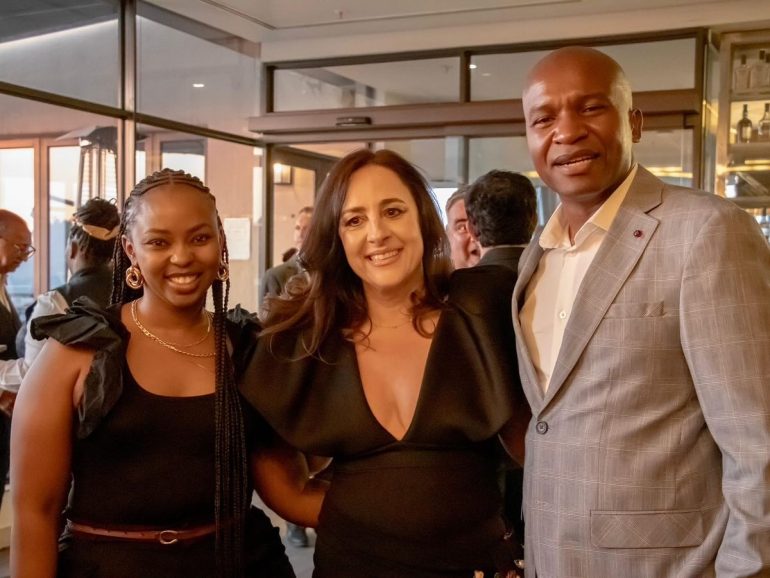- home Home
- keyboard_arrow_right PRESS OFFICE
- keyboard_arrow_right Posts
- keyboard_arrow_rightRemembering Hugh Masekela: the horn player with a shrewd ear for music of the day
Remembering Hugh Masekela: the horn player with a shrewd ear for music of the day
By: Gwen Ansell, University of Pretoria

Esa Alexander/The Times
Trumpeter, flugelhorn-player, singer, composer and activist Hugh Ramapolo Masekela has passed away after a long battle with prostate cancer.
When he cancelled his appearance last year at the Johannesburg Joy of Jazz Festival, taking time out to deal with his serious health issues, fans were forced to return to his recorded opus for reminders of his unique work. Listening through that half-century of disks, the nature and scope of the trumpeter’s achievement becomes clear.
Masekela had two early horn heroes.
The first was part-mythical: the life of jazz great Bix Biederbecke filtered through Kirk Douglas’s acting and Harry James’s trumpet, in the 1950 movie “Young Man With A Horn”. Masekela saw the film as a schoolboy at the Harlem Bioscope in Johannesburg’s Sophiatown. The erstwhile chorister resolved “then and there to become a trumpet player”.
The second horn hero, unsurprisingly, was Miles Davis. And while Masekela’s accessible, storytelling style and lyrical instrumental tone are very different, he shared one important characteristic with the American: his life and music were marked by constant reinvention. As Davis reportedly said:
I don’t want to be yesterday’s guy.
Much has already been written about Masekela’s life and its landmarks: playing in the Huddleston Jazz Band in the 1950s on a horn donated by Louis Armstrong; performing in the musical “King Kong” in the 1960s and at the Guildhall and then Manhattan schools of music with singer Miriam Makeba; US pop successes in the 1970s and then touring Paul Simon’s “Graceland” in the 80s and 90s.
What is less discussed is the music, and the innovative imagination he has periodically applied to draw it fresh from the flames.
Breaking new ground
The Huddleston band, plus time as sideman and in stage shows, were the traditional career path for a young musician. But then Masekela broke his first new ground. With fellow originals, including saxophonist Kippie Moeketsi, pianist Abdullah Ibrahim and trombonist Jonas Gwangwa, as The Jazz Epistles they cut the first LP of modern African jazz in South Africa.
“Jazz Epistle: Verse One” (1960) featured band compositions marked by challenging improvisation – “a cross between mbaqanga and bebop”. Mbaqanga is form of South African township jive and bebop an American jazz style developed in the 1940s.
Masekela had also joined the pit band and worked as a copyist for South Africa’s first black musical, “King Kong”.
This exposure attracted attention to his talent from potential patrons at home and abroad. Pushed by the horrors of the Sharpeville massacre when the South African police shot and killed 69 people on 21 March 1960, and pulled by donated air-tickets and scholarships, Masekela left for London, and then New York.
In the next two decades, Masekela’s re-visioning of his music took many forms. He found America hard, but with wife Miriam Makeba (the marriage lasted from 1964 – 1966), the production skills of Gwangwa, and the support of American singer Harry Belafonte he proactively introduced audiences to South African music and the destruction of apartheid.

Johncom
On the ironically titled 1966 live “Americanisation of Ooga Booga”, he demonstrated the creative possibilities of “township bop”. Masekela did this by mashing up repertoire and playing styles from the South Africa he had left and the America he had landed in.
But he was also looking in other directions: in collaborations with other African musicians; towards fusion (with The Crusaders), rock (with The Byrds) and even pop at the Monterey Pop, festival.
That list captures only a fraction of his projects in the 1960s. Some bore instant fruit: his 1968 single, “Grazin’ In the Grass”, topped the Billboard Hot 100 list and sold four million copies; the previous year’s “Up Up and Away” became an instant standard.
In 1971, he teamed up with Gwangwa and Caiphus Semenya for another pan-African vision: The Union of South Africa. In 1972 he explored a stronger jazz orientation on “Home is Where The Music Is” with, among others, sax player Dudu Pukwana, bassist Eddie Gomez, keyboardist Larry Willis and Semenya.
Sixties counterculture
But as the title of “Grazin’ In the Grass” suggests, Masekela was also bewitched by other aspects of Sixties counterculture. He dated his addiction back to the alcohol-focused social climate of his early playing years in South Africa, but by the early Seventies he admitted:
I had destroyed my life with drugs and alcohol and could not get a gig or a band together. No recording company was interested in me…
That depression inspired the song that achieved genuinely iconic status back home in South Africa: the 1974 reflection on migrant labour, “Stimela/Coal Train”.
Foreign critics have handed that status to other Masekela songs, such as “Soweto Blues”, “Gold” or the much later “Bring Him Back Home”. Yet powerful though those are, it is Stimela, with its slow-burning steam-piston rhythm that captured the hearts of South Africans in struggle back home, and still does today. And of course the lyrics:
There’s a train that comes from Namibia and Malawi /there’s a train that comes from Zambia and Zimbabwe/ from Angola and Mozambique…
Masekela said:
For me songs come like a tidal wave … At this low point, for some reason, the tidal wave that whooshed in on me came all the way from the other side of the Atlantic: from Africa; from home.
Shortly afterwards, Masekela headed off to Ghana, hooked up with Hedzoleh Soundz, and was soon back in the charts. “Stimela” received its first outing on the album “I Am Not Afraid”, with West African and American co-players including pianist Joe Sample.
By the mid ‘80s, the hornman was back in southern Africa, recording “Technobush” at the mobile Shifty Studio in Botswana, and performing for the Medu Arts Ensemble with a Botswanan/South African band, Kalahari. His music shifted again: roots mbaqanga came strongly to the fore to speak simply and directly to people now openly battling the apartheid regime just across the border.
Returning home
After liberation and his return home, Masekela once more chose fresh directions. In 1997 he banished his addictions and began to showcase the virtuoso player he could have been 30 years earlier without the distractions of the West Coast. He fronted big European jazz bands, and benchmarked a long musical friendship with Larry Willis with the magisterial Friends.
But his shrewd ear for the music of today, rather than yesterday, also took him into younger company. He collaborated with current stars – including singer Thandiswa Mazwai – often encouraging them to take centre stage. Just before the recurrence of his cancer, he was planning a festival collaboration with rapper Riky Rick.
To cap the transformation, the individualistic rebel of the 60s and 70s became an elder statesman of social activism. In 2001, he established a foundation to help other musicians escape addiction. Once more he foregrounded the music of continental Africa, to campaign against xenophobia. And the return of his own illness became the cue to exhort other men to get checked for prostate cancer.
Other South African musicians have succeeded overseas; many have made one mid-career image switch – but few have shown us, in only one person but more than 30 albums, so many of the faces and possibilities of South African jazz.
Hugh Masekela, musician, activist. Born: 4 April 1939; Died: 23 January 2018
![]() Masekela Playlist:
Masekela Playlist:
This article was originally published on The Conversation.
Written by: Zuko
Similar posts
QUICK LINKS
UpComing Shows

Kaya Biz
With Gugulethu Mfuphi
The world of business is simplified for you by Kaya Biz with Gugulethu Mfuphi. This fast-paced award-winning business show talks to the corporate giants as well as up and coming entrepreneurs about their wins and challenges. Gugulethu invites guests to offer their analyses of markets and economies, and also delves into issues of personal financial wellness. Kaya Biz airs Mondays to Thursdays 18h00 to 19h00.
close
Point of View
With Phemelo Motene
Point of View with Phemelo Motene delves into the day’s current affairs, touches on real issues that affect people’s daily lives and shares expert advice on questions posed by the audience. Mondays to Thursdays 20:00 to 22:00.
close
959 Music Weekdays
Kaya 959 Hits
Real. Familiar. Memorable. Kaya 959 brings you the music you know and love from our playlist. Uninterrupted. Thursdays 20h00 to 21h00
close
The Best T in the City
With T Bose
He has held it down in the world of mid-morning radio with the best music, riveting topics, brilliant mixes and interesting guests. Every weekday, The Best T proves why he is the BEST by connecting to you like only your bro or favourite uncle could. He lets his listeners dictate the songs they want to hear in the ever-popular Top 10 at 10, and his Three Teaspoons never run out. Catch The Best T in the City Mondays to Fridays from 09h00 to 12h00.
close
Feel Good
With Andy Maqondwana
Feel good about feeling good! That's exactly what The Feel-Good show is about. An escape from the negativity that surrounds us, indulging you in good feels. Pass it on to one and all. Spread the good feeling around Gauteng with Andy Maqondwana.
closeConnect with Kaya 959
DownLoad Our Mobile App
© 2024 Kaya 959 | On The Street On The Air















